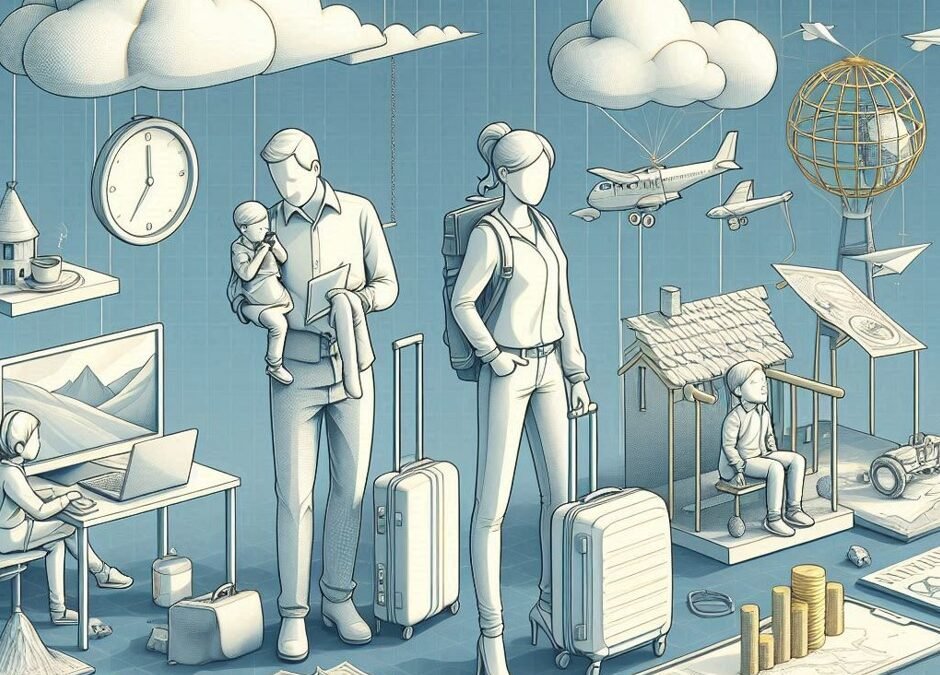The Emotional Impact on Families When Salespeople Travel Frequently for Work
As a father who’s spent a good portion of his career traveling for work, I’ve seen first-hand how it can affect a family. Being away from home, especially when you have young children, pulls at your heartstrings in ways that can be tough to describe. While traveling might be necessary for work, it’s important to recognize the emotional toll it can take on both the traveling parent and the loved ones left behind.
When I was on the road, leaving behind my young kids, I knew I had to find a way to stay connected, even from miles away. So, I made it a point to carve out at least an hour every day for a video call with my family. It wasn’t just about checking in—it was about maintaining that bond, that sense of togetherness, even when we were apart. There’s something so comforting about seeing each other’s faces, confirming that everyone is doing okay and coping with the separation.
During those calls, I would play a simple game of Hot and Cold with my kids. You see, they were too young to really understand why Daddy had to be away, and explaining it to them in a way that made sense was nearly impossible. So instead, I made sure our calls were about fun and connection. Before I left, I’d hide sweets around the house, and during our video chats, I’d guide them to find the treats, saying “hotter” when they got close and “colder” when they moved away. It wasn’t just a game—it was a way to create happy moments together, making the time apart feel a little less lonely for all of us.
I found that these daily interactions not only lifted the spirits of my family but also helped me feel more involved as a father, even when I couldn’t be there in person. It made the distance a little more bearable, and I believe it helped soften the impact of my absences. However, as my children grew older, my daughter, who developed a sharp sense of humour, would jokingly ask me when I’d be traveling again—because apparently, that was the only time sweets magically appeared in the house!
How Roles Shift and Change
Being away from the people you love can create an emotional gap that’s hard to bridge, even with regular communication. The absence of those everyday moments—like tucking your kids into bed or sharing a meal—can make both you and your partner feel distant. And that’s something you have to work hard to overcome. I often felt that disconnect and knew we had to work extra hard to keep our relationship strong.
How It Affects the Little Ones
Kids feel the absence too, even if they can’t always express it. They might not understand why a parent has to be away, but they feel the difference in their day-to-day life. I noticed that my children would sometimes act out or feel more anxious when I was gone, and it broke my heart. It’s tough knowing that your job, which provides for them, is also something that causes them stress.
The Stress We All Feel
There’s no denying that frequent travel adds stress—for everyone involved. As the one traveling, you worry about how your family is doing without you, and your partner at home worries about managing everything alone. I’ve had my fair share of sleepless nights, wondering if I was doing right by my family.
Finding Ways to Stay Connected
Staying connected with your family while you’re on the road is crucial, not just for maintaining your relationships, but for your own well-being too. As challenging as it is, there are plenty of ways to keep those bonds strong, even when miles separate you. For me, it was about making sure that every day, no matter how hectic, I carved out time for a video call with my family. But there’s so much more you can do to keep that connection alive.
Prioritize Consistent Communication
Consistency is key when it comes to staying connected. Try to establish a routine time for daily check-ins with your family. Whether it’s early in the morning before you start your day or in the evening when the house is quiet, having a set time to talk can provide comfort and predictability for everyone. For instance, you could start your day with a quick “Good Morning” call, where you chat while having breakfast, or wind down with a bedtime story over video chat. These moments help maintain the rhythm of family life, even when you’re far away.
Share Your Day with Them
One way to bridge the distance is by sharing your experiences with your family. Send photos or short videos throughout the day of where you are and what you’re doing. It could be a snapshot of a beautiful sunrise in a different city, a short video of a quirky moment during your workday, or even a picture of your hotel room. It helps them feel included in your world and gives you something tangible to talk about during your calls..
Get Creative with Games and Activities
Beyond just talking, finding interactive ways to engage with your family can make your time apart feel more like time together. Games like Hot and Cold are great for younger children, but you can also explore other activities. Maybe you could read a chapter of a book together every night, or work on a long-term project like a shared photo album or a family scrapbook that you update with new memories from both home and the road.
For older kids or even your partner, you could play online games together, watch the same movie or show and discuss it afterward, or have a virtual dinner date where you both cook and eat the same meal while chatting. These shared experiences, even when virtual, help maintain the sense of togetherness that’s so important for a family.
Leave Behind Little Surprises
Before you leave for a trip, consider hiding little notes or small gifts around the house for your family to find while you’re gone. These surprises can be something to look forward to and a reminder that you’re thinking of them even when you’re away. It could be as simple as a handwritten note tucked under a pillow or a small toy or trinket hidden in a favourite spot. These small gestures can go a long way in keeping your presence felt at home.
Plan for Your Return
Planning something special for when you come back can also help maintain that connection. It doesn’t have to be anything extravagant—maybe it’s a family movie night, a special dinner, or a day out doing something everyone loves. Knowing that there’s something to look forward to when you return can help both you and your family cope with the separation.
How Companies Can Help
While personal efforts to stay connected are essential, companies also play a crucial role in supporting employees who travel frequently. Here are some ways organizations can make a difference:
Flexible Work Arrangements
Employers can offer flexible work schedules that allow traveling employees to balance their professional and personal lives better. For example, allowing a late start or early finish to the workday can give parents more time to connect with their families during critical parts of the day, such as breakfast or bedtime.
Travel Reduction Programs
Where possible, companies can reduce the need for frequent travel by utilizing technology. Virtual meetings, remote work options, and video conferencing can often replace the need for some in-person meetings. Not only does this reduce the burden on employees, but it also cuts down on travel expenses for the company
Family Support Initiatives
Organizations can create programs specifically designed to support the families of traveling employees. This could include offering access to family counseling services, providing resources for childcare, or organizing family events where employees can bring their spouses and children. Some companies even provide travel vouchers or arrange for family members to visit the employee during extended trips.
Paid Time Off
Ensuring that traveling employees have ample paid time off (PTO) is another way companies can help. Encouraging employees to take breaks after long stretches of travel, and spend quality time with their families, can alleviate some of the stress caused by frequent absences.
Mental Health Support
Traveling for work can take a toll on mental health, not just for the employee but for their family as well. Companies can offer mental health resources, such as access to counselling or stress management programs, to support both the employee and their loved ones. Acknowledging the challenges that come with frequent travel and providing support can make a significant difference in how employees and their families cope.
Encouraging Work-Life Balance
Finally, fostering a culture that values work-life balance is essential. When companies actively encourage employees to prioritize their families and personal well-being, it helps create an environment where employees feel supported, not just as workers, but as individuals with lives and responsibilities outside of work..
Conclusion
Staying connected with your family while traveling for work is never easy, but with a little creativity and effort, you can maintain those all-important relationships. And when companies step up to support their traveling employees, it not only benefits the families but also leads to happier, more productive workers.
After all, when you feel grounded in your personal life, you’re much more likely to thrive professionally as well.
References:
- American Psychological Association (APA). (2018). Role Overload and Stress. Retrieved from APA.org.
- Sahlstein, E. M. (2006). When Distance Matters: Effects of Physical Separation on Marital Satisfaction. Journal of Family Psychology, 20(3), 507-512.
- National Institutes of Health (NIH). (2015). The Impact of Parental Absence on Children’s Well-being. Retrieved from NIH.gov.
- Westman, M., Etzion, D., & Gortler, E. (2009). The Impact of Work-related Travel on Stress and Family Life. Occupational Health Psychology, 14(3), 123-130.
- Society for Human Resource Management (SHRM). (2020). Supporting Employees Who Travel Frequently for Work. Retrieved from SHRM.org.

